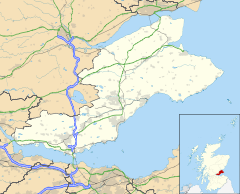North Queensferry
North Queensferry
|
|
|---|---|
 North Queensferry from the Forth Road Bridge |
|
| North Queensferry shown within Fife | |
| Population | 1,150 |
| OS grid reference | NT130806 |
| • Edinburgh | 10 mi (16 km) ESE |
| • London | 338 mi (546 km) SSE |
| Council area | |
| Lieutenancy area | |
| Country | Scotland |
| Sovereign state | United Kingdom |
| Post town | INVERKEITHING |
| Postcode district | KY11 |
| Dialling code | 01383 |
| Police | Scottish |
| Fire | Scottish |
| Ambulance | Scottish |
| EU Parliament | Scotland |
| UK Parliament | |
| Scottish Parliament | |
North Queensferry is a village in Fife, Scotland, on the Firth of Forth, between the Forth Bridge and the Forth Road Bridge, and 10 miles (16.1 km) from Edinburgh. According to the 2008 population estimate, the village has a population of 1,150. It is the southernmost settlement in Fife.
The Scottish Gaelic name "Taobh a Tuath Chas Chaolais" means "[the] Northern Side of [the] Steep Strait". The name "Cas Chaolas" (Steep Strait) is older than the English name "Queensferry" and older than the Scottish Gaelic equivalent of the English name, which is "Port na Banrighinn" (the port of the queen). "Cas Chaolas" can be applied to either North or South Queensferry, or both.
The village takes its name from Saint Margaret of Scotland, the wife of King Malcolm III of Scotland, who is said to have established the village to ensure there would be regular ferry crossings across the Firth of Forth for the benefit of pilgrims travelling to St Andrews. Margaret is said to have made her arrival in Scotland here in 1068, and to have regularly used the ferry crossing when travelling between the then capital Dunfermline, and Edinburgh Castle. From around this time, the crossing became known as the Queen's Ferry.
Margaret died in 1093 and made her final journey by ferry to Dunfermline Abbey, where she remains buried. Her son, David I of Scotland, awarded the ferry rights to the abbey.
However, it is likely that there was a settlement around the present site of the village long before the time of Margaret. The site of the village, on the narrowest part of the Firth of Forth, with added advantage of the island of Inchgarvie in between, suggests that it would have been the natural point of crossing and a vital link to the north of Scotland for centuries before the Queen's Ferry was established.
...
Wikipedia

